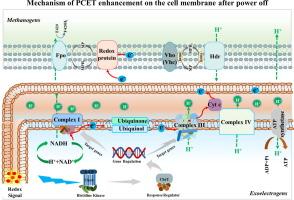Up-regulated proton pump expression after power off promoted proton transfer to enhance anaerobic digestion
IF 13.2
1区 工程技术
Q1 ENGINEERING, CHEMICAL
引用次数: 0
Abstract
Microbial electrolysis cell coupled of anaerobic digestion (MEC-AD) can enhance organics removal and methane production of anaerobic digestion even under the intermittent voltage supply, but the reason remains unclear. In this study, compared to an anaerobic digester free of voltage, the methane production of MEC increased by 26.0 % and the organic decomposition increased by 12.9 ± 1.9 %. Notably, the anaerobic digestion performance of MEC was maintained well after the power applied to the electrode was turned off, and the methane production was similar to the power-on stage. However, the electrochemical properties of the cathode biofilm decreased after power off, which generally restrained microbial interspecies electron transfer to reduce methane production of anaerobic digestion. Accordingly, electrophoresis and ThT tests indicated that the proton transfer of biofilm was enhanced after the power was turned off, which might help the performance of the MEC to remain good. Macrotranscriptomics analysis suggested that the expression of the proton pump genes was up-regulated to promote proton and electron circulation and enhance proton transfer. The EPR analysis indicated that the improved redox signal of carbon-centered radical (i.e., ·C-O-H) after power off promoted the expression of proton pumps thereby intensifying proton transfer and methane production. This study suggested that the up-regulation of proton pump expression promoted proton transfer to compensate for the decrease in electron transfer after power off, which could well maintain anaerobic digestion performance.

断电后质子泵表达上调,促进质子转移,促进厌氧消化
微生物电解池耦合厌氧消化(MEC-AD)即使在间歇电压供电下也能提高厌氧消化的有机物去除和甲烷产量,但其原因尚不清楚。在本研究中,与无电压厌氧消化池相比,MEC的甲烷产量增加了26.0 %,有机分解增加了12.9 ± 1.9 %。值得注意的是,关闭电极电源后,MEC的厌氧消化性能保持良好,甲烷产量与通电阶段相似。然而,关闭电源后,阴极生物膜的电化学性能下降,这通常会抑制微生物种间电子转移,从而减少厌氧消化的甲烷产量。因此,电泳和ThT测试表明,关闭电源后,生物膜的质子转移增强,这可能有助于MEC保持良好的性能。宏观转录组学分析表明,质子泵基因表达上调,促进质子和电子循环,增强质子转移。EPR分析表明,断电后碳中心自由基(即·C-O-H)氧化还原信号的增强促进了质子泵的表达,从而加强了质子转移和甲烷的产生。本研究表明,质子泵表达的上调促进了质子转移,弥补了关闭电源后电子转移的减少,可以很好地维持厌氧消化性能。
本文章由计算机程序翻译,如有差异,请以英文原文为准。
求助全文
约1分钟内获得全文
求助全文
来源期刊

Chemical Engineering Journal
工程技术-工程:化工
CiteScore
21.70
自引率
9.30%
发文量
6781
审稿时长
2.4 months
期刊介绍:
The Chemical Engineering Journal is an international research journal that invites contributions of original and novel fundamental research. It aims to provide an international platform for presenting original fundamental research, interpretative reviews, and discussions on new developments in chemical engineering. The journal welcomes papers that describe novel theory and its practical application, as well as those that demonstrate the transfer of techniques from other disciplines. It also welcomes reports on carefully conducted experimental work that is soundly interpreted. The main focus of the journal is on original and rigorous research results that have broad significance. The Catalysis section within the Chemical Engineering Journal focuses specifically on Experimental and Theoretical studies in the fields of heterogeneous catalysis, molecular catalysis, and biocatalysis. These studies have industrial impact on various sectors such as chemicals, energy, materials, foods, healthcare, and environmental protection.
 求助内容:
求助内容: 应助结果提醒方式:
应助结果提醒方式:


